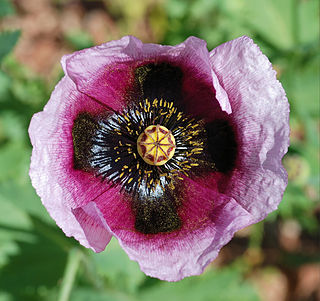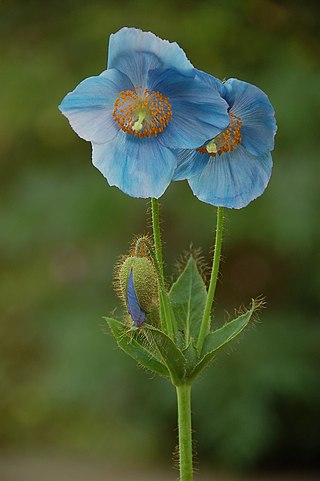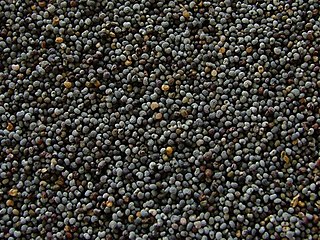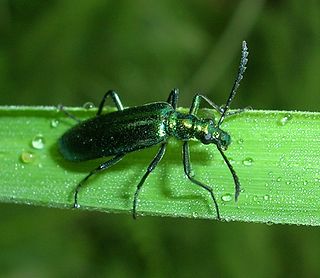
Thebaine (paramorphine), also known as codeine methyl enol ether, is an opiate alkaloid, its name coming from the Greek Θῆβαι, Thēbai (Thebes), an ancient city in Upper Egypt. A minor constituent of opium, thebaine is chemically similar to both morphine and codeine, but has stimulatory rather than depressant effects. At high doses, it causes convulsions similar to strychnine poisoning. The synthetic enantiomer (+)-thebaine does show analgesic effects apparently mediated through opioid receptors, unlike the inactive natural enantiomer (−)-thebaine. While thebaine is not used therapeutically, it is the main alkaloid extracted from Papaver bracteatum and can be converted industrially into a variety of compounds, including hydrocodone, hydromorphone, oxycodone, oxymorphone, nalbuphine, naloxone, naltrexone, buprenorphine, butorphanol and etorphine.

Eschscholzia californica, the California poppy, golden poppy, California sunlight or cup of gold, is a species of flowering plant in the family Papaveraceae, native to the United States and Mexico. It is cultivated as an ornamental plant flowering in summer, with showy cup-shaped flowers in brilliant shades of red, orange and yellow. It is also used as food or a garnish. It became the official state flower of California in 1903.

Eschscholzia is a genus of 12 annual or perennial plants in the Papaveraceae (poppy) family. The genus was named after the Baltic German/Imperial Russian botanist Johann Friedrich von Eschscholtz (1793–1831). All species are native to Mexico or the southern United States.

In Australia and New Zealand, along with Canada, tall poppy syndrome refers to successful people being criticised. This occurs when their peers believe they are too successful, or are bragging about their success. Intense scrutiny and criticism of such a person is termed as "cutting down the tall poppy".

Papaver is a genus of 70–100 species of frost-tolerant annuals, biennials, and perennials native to temperate and cold regions of Eurasia, Africa and North America. It is the type genus of the poppy family, Papaveraceae.

Papaver somniferum, commonly known as the opium poppy or breadseed poppy, is a species of flowering plant in the family Papaveraceae. It is the species of plant from which both opium and poppy seeds are derived and is also a valuable ornamental plant grown in gardens. Its native range was east of the Mediterranean Sea, but now is obscured by ancient introductions and cultivation, being naturalized across much of Europe and Asia.

Poppy Montgomery is an Australian-American actress. She played FBI agent Samantha Spade on the CBS mystery drama Without a Trace from 2002 to 2009 and played Detective Carrie Wells on the CBS/A&E police drama Unforgettable from 2011 to 2016.

Meconopsis is a genus of flowering plants in the poppy family Papaveraceae. It was created by French botanist Viguier in 1814 for the species known by the common name Welsh poppy, which Carl Linnaeus had described as Papaver cambricum. The genus name means "poppy-like". Himalayan species discovered later were also placed in Meconopsis. In the 21st century, it was discovered that the Himalayan species were less closely related to the Welsh poppy, which has been restored to Papaver. All species now placed in Meconopsis are native to the Himalayas and surrounding regions. They have attractive, usually blue flowers.

The flea beetle is a small, jumping beetle of the leaf beetle family (Chrysomelidae), that makes up the tribe Alticini which is part of the subfamily Galerucinae. Historically the flea beetles were classified as their own subfamily.

Canbya, also known as the pygmy poppies, is a genus of the poppy family Papaveraceae consisting of two species found in the dry parts of western North America. Both species are small, no more than a few centimeters tall, with flowers less than 10 mm across.

Poppy seed is an oilseed obtained from the opium poppy. The tiny, kidney-shaped seeds have been harvested from dried seed pods by various civilizations for thousands of years. It is still widely used in many countries, especially in Central Europe and South Asia, where it is legally grown and sold in shops. The seeds are used whole or ground into meal as an ingredient in many foods – especially in pastry and bread – and they are pressed to yield poppyseed oil.

Acanthacris is a genus of African grasshoppers in the subfamily Cyrtacanthacridinae.

Prionoceridae is a small family of beetles, in the suborder Polyphaga. They form a group within the cleroid beetles and were formerly treated as a subfamily (Prionocerinae) within the family Melyridae. Very little is known of their life history but most species are pollen feeders as adults and occur in large numbers during spring or the host flowering season. Larvae are predatory or feed on decomposing wood.

Sinechostictus is a genus of ground beetles in the family Carabidae. There are more than 30 described species in Sinechostictus.

Grammoptera is a genus of beetles in the family Cerambycidae, distributed primarily in the Northern Hemisphere.

Stephen Bourne is a British writer, film and social historian specialising in Black heritage and gay culture.
Cratocentrus is a genus of wasps in the family Chalcididae. Species are found in Asia and Africa.
Tricholamia ruficornis is a species of beetle in the family Cerambycidae. It was described by Hintz in 1911, originally under the genus Moechopsis. It is known from Tanzania and the Democratic Republic of the Congo.

Parabrimus ruficornis is a species of beetle in the family Cerambycidae. It was described by Breuning in 1981. The species is combined with the Parabrimus genus ranked in the Phrissomini tribe of Lamiinae.

Coelomera is a genus of beetles belonging to the family Chrysomelidae.


















